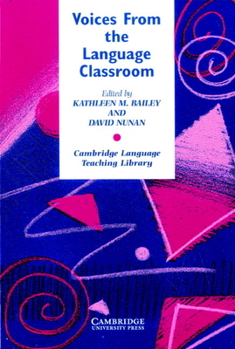Voices from the Language Classroom
(Part of the Cambridge Language Teaching Library Series)
Select Format
Select Condition 
Book Overview
This text is about what really happens in language classrooms. This paperback edition is about what really happens in language classrooms, both those in which language is the topic of instruction and... This description may be from another edition of this product.
Format:Paperback
Language:English
ISBN:0521559049
ISBN13:9780521559041
Release Date:February 1996
Publisher:Cambridge University Press
Length:484 Pages
Weight:1.50 lbs.
Dimensions:1.2" x 5.9" x 9.2"
Customer Reviews
2 ratings
Lots of voices
Published by Thriftbooks.com User , 17 years ago
This book has a very interesting format. I have not seen anything quite like it. This is the textbook I am using, and I am learning from one of the actual authors of the book. This book is very helpful if you want to know what kinds of things happen inside ESL classrooms. Good for ESL teachers who have already had some classroom experience or have seen an ESL class . It might be too overwhelming to novice teachers--I think. Cheers, Professors!
Identifies and voices complexities involved in SL studies.
Published by Thriftbooks.com User , 26 years ago
Voices From The Classroom is a collection of international stories written and presented in a naturalistic inquiry paradigm and are examples of qualitative research. The editors, Kathleen Bailey and David Nunan, are language professors and researchers from the Monterey Institute of International Studies in California and ESADE Idiomas in Barcelona, Spain respectively. Bailey and Nunan write two of nineteen articles that comprise the book's chapters. Seventeen other educators and researchers were invited to contribute to the book; however, only unpublished stories were accepted. The articles are grouped according to thematic sections which include: 1.) Teaching as thinking, doing, and interpreting, 2.) Classroom dynamics and interaction, 3.) The classroom and beyond, 4.) Curricular issues, and 5.) Sociopolitical perspectives. At the end of each section the reader is provided with `questions and tasks' that seek to highlight or consider issues and concerns that surfaced in each section. Sections one and two consider issues and concerns voiced by teachers in the field. Section three addresses language experiences outside of the classroom and, and what effect, if any, do these experiences have on learning a language. Section four looks specifically at the complexities of developing, implementing, and evaluating a language curriculum. Section five considers a more global aspect of teaching and learning and situates these studies within certain geographical, political, and social parameters. Perhaps the greatest strength of Voices From The Classroom is that it introduces the reader to various types of qualitative research such as the use of metaphors, action research, ethnography, case study and narrative dairy. The reader is presented with a rich selection of data samplings which include, but are not limited to, field notes, lesson plans and transcripts, video/audio tapings, teachers' and learners' journals, teacher and student interviews, teacher/researcher narratives, and stimulated recall protocols. The editors explain that these samplings provide the data necessary for conducting qualitative research, and for permitting data triangulation, or the notion that two or more perspectives of a given phenomena are essential to accurately capture and present any type of discourse identifying or explaining a particular phenomenon. Early on, the reader recognizes how qualitative research seems to lend itself to research conducted and situated within a foreign or second language context. Just as individual languages are salient and fluid so too must be the methodologies used to investigate their realities. As with any publication, authors and editors are frequently asked to make revisions to materials submitted for publication. Unfortunately, these revisions, more often that not, require that authors and editors take serious steps to reduce the number of pages, sentences or words used to recount an experience or event. Con






